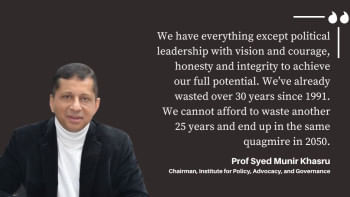Singapore's role in recovering stolen assets is crucial

Impressive global rankings and statistics are a testament to Singapore's accomplishments as the world's fifth least corrupt country and the only Asian nation in the top 10. The country is also a leader in the World Justice Project Rule of Law Index, ranking 16th out of 142 countries globally and fourth regionally in 2024, indicating its strong legal and regulatory framework.
Bangladesh and Singapore share a friendly and dynamic relationship, with Bangladeshi workers being a significant part of Singapore's 1.5 million migrant workers and a substantial addition to the country's economy. Over 160,000 Bangladeshi nationals are contributing to essential sectors such as construction and marine industries in Singapore. In 2022 alone, 64,383 Bangladeshi workers were hired in Singapore, setting a record, and their remittances contribute substantially to Bangladesh's economy.
Construction contracts worth $32 billion to $38 billion are anticipated to be awarded in Singapore in 2024, with a substantial portion benefiting from Bangladeshi labour. Meanwhile, Bangladesh trains around 5,000 workers annually at specialised centres certified by the Singapore authorities to meet the country's workforce demands. These collaborations underscore interdependence of their economies and a relationship based on mutual growth.
Bangladesh at a crossroads
The ousting of Sheikh Hasina on August 5, 2024 has unleashed a wave of uncertainty as well as opportunities in Bangladesh. The interim administration, led by Chief Adviser Prof Muhammad Yunus, has vowed to root out corruption and restore good governance. The government has also formally requested the United Nations' investigation into the mass killings and human rights violations during Hasina's final months in power.
Yet, the remnant of embedded systemic corruption looms large in Bangladesh against the backdrop of social, political, and economic reforms. Allegations against the Awami League government, including mismanagement of megaproject funds and money laundering, underline the overwhelming challenges that are to follow while restructuring the nation. The Anti-Corruption Commission (ACC) has launched extensive investigations into key figures of the former administration for alleged embezzlement and laundering of billions of dollars. Specific projects under scrutiny include the Rooppur Nuclear Power Plant (RNPP) suspected of financial irregularities amounting to around $5 billion. Hence, these probes, though wearisome, represent a crucial effort to address years of unrestrained corruption, involving not only former politicians but also prominent business tycoons who have managed to evade justice by fleeing the country or stashing cash in convenient overseas destinations.
A case in systemic corruption testing Singapore's institutional integrity
At the heart of the arising corruption allegations lies the S Alam Group, led by Mohammed Saiful Alam, who has been accused of laundering over $1 billion through entities in Singapore and other countries. Alam's case has become a glaring indicator of financial systems being exploited for illicit purposes. In fact, latest investigations have revealed that Alam funnelled significant sums through shell companies, leveraging his influence to secure questionable loans worth thousands of crores from Bangladeshi banks like Islami Bank, often coupled with collateral compensating for only a fraction of the loan value.
Building on S Alam's case, Singapore's role as a destination for the said laundered funds has raised concerns about its advanced financial infrastructure being exploited to channel and shelter illicit wealth. Reports indicate that funds from Bangladesh were routed to Singapore via offshore mechanisms, raising concerns about regulatory loopholes that might have facilitated such transactions. In this regard, the ACC has requested Singapore's cooperation in tracking these funds and ensuring accountability. Addressing these allegations can help Singapore set a precedent for combating transnational financial crimes, consistent with the country's standing in global finance. There are also other controversial Bangladeshi industrial conglomerates who have built a base in Singapore.
A moral and strategic imperative for Singapore
By taking just, fair, and decisive action and ensuring its financial systems are not exploited, Singapore has an opportunity to solidify its role as a leader in upholding justice and transparency. This is no less a moral test for the country as it is of legal consequences for a nation that is globally applauded for its rule of law. Singapore cannot afford to be perceived as a safe harbour for illicit wealth, especially embezzlement of public funds that exacerbate poverty and foment political instability elsewhere. At this critical juncture of the country, it is natural for Bangladesh to expect Singapore to address these allegations by freezing suspect assets and cooperating with Bangladeshi authorities.
By tackling these challenges head-on, Singapore will not only uphold the integrity of its own systems but will also support the global fight against corruption, defending rights of the less privileged, bringing to justice those who have plundered a nation's resources and drained the banking sector. As at least 10 Bangladeshi banks are on the verge of collapse and depositors scratch their heads for the money looted from their coffers, Singapore has a responsibility to help Bangladesh retrieve the ill-gotten money that has found its way into the Singaporean shore.
Prof Syed Munir Khasru is chairman of the Institute for Policy, Advocacy, and Governance (IPAG), an international think tank.
Views expressed in this article are the author's own.
Follow The Daily Star Opinion on Facebook for the latest opinions, commentaries and analyses by experts and professionals. To contribute your article or letter to The Daily Star Opinion, see our guidelines for submission.

 For all latest news, follow The Daily Star's Google News channel.
For all latest news, follow The Daily Star's Google News channel. 











Comments